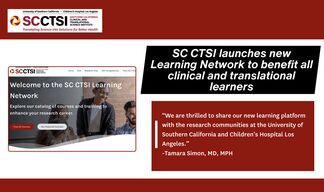SC CTSI Community Engagement Team Member Presents at National Conference
Increasing the public’s access to research.
On Wednesday, April 2, 2014 Holly Kiger, RN, MN represented the SC CTSI Community Engagement team at the NIMH Outreach Partnership annual meeting in Bethesda, MD. The Outreach Partnership Program is a nationwide initiative of the National Institute of Mental Health.
The Program works to increase the public’s access to science-based mental health information through partnerships with national and state nonprofit organizations. It emphasizes reaching historically underserved populations and strives to enhance opportunities for the public to benefit from participation in research.
The 55 NIMH Outreach Partnerships throughout the country provide the network with the opportunity to engage community organizations in dialogue to better understand the needs, questions, and concerns of those intended to benefit from the research the Institute supports.
At the annual meeting, Holly Kiger presented a poster on the Promotora Training Institute, which is being developed by the Southern California CTSI Consortium. Four southern California CTSIs (SC CTSI, UCLA CTSI, Scripps CTSI and UCSD CTSI) and two community agencies are working together to create a curriculum to empower Promotoras, lay workers in the Hispanic community, to help educate the Hispanic population about research, to increase participation of Hispanics in clinical trials, and to help promote the use of Promotores in all areas of community-based research.
Kiger also joined a panel “Bringing Community Voice to the Research Process: Engaging Patients Throughout the Research Process” with Sue Sheridan, MBA, MIM, Director of Patient Engagement at the Patient-Centered Outcomes Research Institute (PCORI).
Kiger gave an overview of Community Engaged Research and talked about the Recovery Oriented Care Collaborative, a Practice Based Research Network developed by four community-based mental health agencies in Los Angeles County and supported by a SC CTSI Academic Community Partnership pilot grant and in-kind staffing support from Holly Kiger, Research Navigator with Community Engagement, and John Brekke from the USC School of Social Work.
Their first card study, conducted in the fall of 2013, focused on evaluating outcomes from the health/mental health integration projects that were begun in July of 2011 to address the lack of access to physical health care experienced by many mentally ill consumers.



